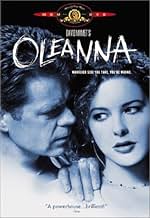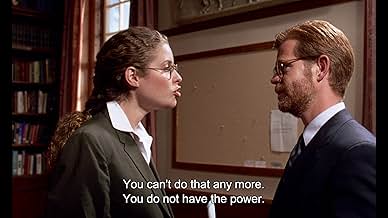IMDb रेटिंग
6.5/10
3.8 हज़ार
आपकी रेटिंग
अपनी भाषा में प्लॉट जोड़ेंWhen a student visits her professor to discuss how she failed his course, the discussion takes an awkward turn.When a student visits her professor to discuss how she failed his course, the discussion takes an awkward turn.When a student visits her professor to discuss how she failed his course, the discussion takes an awkward turn.
- पुरस्कार
- कुल 1 नामांकन
Diego Pineda
- Quarterback
- (बिना क्रेडिट के)
Scott Zigler
- Clerk in Copy Shop
- (बिना क्रेडिट के)
फ़ीचर्ड समीक्षाएं
This film is basically about a student who cannot accept she's failing class and decides to ruin her teacher's life by framing him. Around this basis, a quite witty dialogue is unfolded, which makes the movie intellectually stimulating and powerful. Additionally, it depicts the invalidity of some axioms of both professor and student community and portraits how people manipulate the truth to serve their personal interests. A very strong point is how pompous and cliche arguments about void pseudo-liberties alienate people from truly disastrous and desperate situations. As I see from other reviews, the play was much better, but unfortunately we didn't have the chance to see it here in Greece yet, so my first impression of Mamet's work was from this movie.
One general misunderstanding (in my opinion) of Mamet is that he tries to write realistic dialog. In Oleanna, Mamet seems to want to speak directly through each character in a very academic verse which is well suited to the film/play. The issues of sexual misconduct and the way perspectives differ between men and women make this an interesting journey. And if you are a Bill Macy fan, you will like the movie.
10oowawa
One writer perceptively suggests that the term "Oleanna" was used to describe swampland being sold as prime real estate.
I think the primary context in which the title "Oleanna" is to be understood appears in a "folk" stanza preceding Mamet's published edition of the play:
"Oh to be in 'Oleanna,'/ That's where I would rather be,/ Than be bound in Norway/ And drag the chains of slavery."
And so, Oleanna is a version of a Utopian promised land, and in the context of the play, the gateway to this better tomorrow is through the halls of Academia. Susan, the victim of her own false expectations of how the university is to transform her existence, repeatedly mentions the struggle she had to endure in order to get into college. For her, academic success is central to her vision of a better life. John, the pedantic professor, also sees Academia as the means to a comfortable, upper middle class existence with his new house, wife, and son. All he needs to do is make tenure, and his future is secured.
However, John presents himself as an academic bad-boy who debunks the very Academia with which he is trying to secure his comfortable future. This ridicule of the academic process strikes at the heart of Carol's dreams of a better future through education. She quite rightly sees that the professor is trying to have it both ways--playing the academic outsider while trying to kiss-up to the tenure committee in order to ensure his cushy new home in the suburbs. When someone's dreams are threatened, they become angry and strike out, however they can.
This is a brilliant movie. Anyone working in a high school or university, and anyone contemplating an academic career, needs to watch it, and allow it to soak deep into the structure of the brain. Perhaps that academic career isn't such a good idea, after all. Maybe that utopian real estate is really swampland. At any rate, one needs to be very, very careful when dealing with students.
I think the primary context in which the title "Oleanna" is to be understood appears in a "folk" stanza preceding Mamet's published edition of the play:
"Oh to be in 'Oleanna,'/ That's where I would rather be,/ Than be bound in Norway/ And drag the chains of slavery."
And so, Oleanna is a version of a Utopian promised land, and in the context of the play, the gateway to this better tomorrow is through the halls of Academia. Susan, the victim of her own false expectations of how the university is to transform her existence, repeatedly mentions the struggle she had to endure in order to get into college. For her, academic success is central to her vision of a better life. John, the pedantic professor, also sees Academia as the means to a comfortable, upper middle class existence with his new house, wife, and son. All he needs to do is make tenure, and his future is secured.
However, John presents himself as an academic bad-boy who debunks the very Academia with which he is trying to secure his comfortable future. This ridicule of the academic process strikes at the heart of Carol's dreams of a better future through education. She quite rightly sees that the professor is trying to have it both ways--playing the academic outsider while trying to kiss-up to the tenure committee in order to ensure his cushy new home in the suburbs. When someone's dreams are threatened, they become angry and strike out, however they can.
This is a brilliant movie. Anyone working in a high school or university, and anyone contemplating an academic career, needs to watch it, and allow it to soak deep into the structure of the brain. Perhaps that academic career isn't such a good idea, after all. Maybe that utopian real estate is really swampland. At any rate, one needs to be very, very careful when dealing with students.
David Mamet can write a play! This one made me writhe with anger at the P.C. crowd in our universities (not that all PC is bad--I am a linguist)who are watering down the national education. What's wrong with saying what you mean? I am a woman and I cannot actually believe that there are two sides on this issue...a pat on the back cannot possibly be seen (alone) as sexual harassment, nor can writing a very bad essay merit an "A" in my idealistic mind. A poor writer is a poor writer, no matter what the background. Many of out best American writers have come from the working class. Should education be modified yet again to accommodate those who do not care to work for their merits? Just a thought. Would love to hear more from others...
The tag line of this movie is that "whichever side you take, you're wrong," is itself wrong. There clearly is a wrong and right side. If we were to sit Catherine McKinnon and Andrea Dworkin down and show them only the first half of the movie, even they would be pressed to find any sexual harassment (let alone rape). We would find a self-absorbed professor, and knifing student (whose clipped speech, and apparent dumbfoundedness is belied later when she fabricates, embellishes, and spins the truth for her PC ends). If being self-absorbed is enough to get one fired and falsely accused of rape, then Mamet's lesson must be that the feminist orthodoxy has gone too far.
क्या आपको पता है
- ट्रिवियाDavid Mamet's script was heavily criticized as sexist. He defended himself against this allegation in (Guardian supplement) (UK) 8 April 2004, pg. 8-9, "'Why can't I show a woman telling lies?'"
- गूफ़When Carol leaves John's office after their second meeting, shouting "Help!", the shadow of the camera covers the door.
- इसके अलावा अन्य वर्जनThere is a version of the movie circulating in Australia, in a series of videos along with other David Mamet films including "A Life in the Theater". This particular copy of the film is timecoded. In that version, after Carol tells John not to call his wife "baby," (thus sending him into a torrent of rage), and he slaps her arm and grabs her, screaming a sexual expletive and raising a chair above her head, the door to the hallway swings open and a number of people stand in the hallway, observing the fight and thus hopelessly damning John. In the version now appearing on The Sundance Channel (10/05), the expletive is unchanged but he never lifts the chair and the door never opens; aside from a final exterior shot of the school, the film ends with Carol (Eisenstadt) having collapsed on the floor of John's office, and John sitting in his chair, his head buried in his hands.
- साउंडट्रैकLong Ago And Far Away
Words by David Mamet
Music by Rebecca Pidgeon
Soloist: Steve Goldstein (as Steven Goldstein)
© Copyright 1994 Dwight Street Music
टॉप पसंद
रेटिंग देने के लिए साइन-इन करें और वैयक्तिकृत सुझावों के लिए वॉचलिस्ट करें
- How long is Oleanna?Alexa द्वारा संचालित
विवरण
- रिलीज़ की तारीख़
- कंट्री ऑफ़ ओरिजिन
- आधिकारिक साइटें
- भाषा
- इस रूप में भी जाना जाता है
- David Mamet's Oleanna
- फ़िल्माने की जगहें
- उत्पादन कंपनियां
- IMDbPro पर और कंपनी क्रेडिट देखें
बॉक्स ऑफ़िस
- US और कनाडा में सकल
- $1,24,693
- US और कनाडा में पहले सप्ताह में कुल कमाई
- $25,316
- 6 नव॰ 1994
- दुनिया भर में सकल
- $1,24,693
इस पेज में योगदान दें
किसी बदलाव का सुझाव दें या अनुपलब्ध कॉन्टेंट जोड़ें
























